1969-90 Political activism
Strictly speaking the "Kolo" never took part in any overtly political activity, because it was constitutionally prevented form doing so. Its charitable status, as part of the Polish Benevolent Fund, also forbade it. Nevertheless, members of the "Zarzady", be it of the "Kolo", Club or Parents' Committee, followed events in Poland closely, and set up various ad hoc committees over the years. That is why no history of the Polish community in Leamington Spa can ignore this issue.
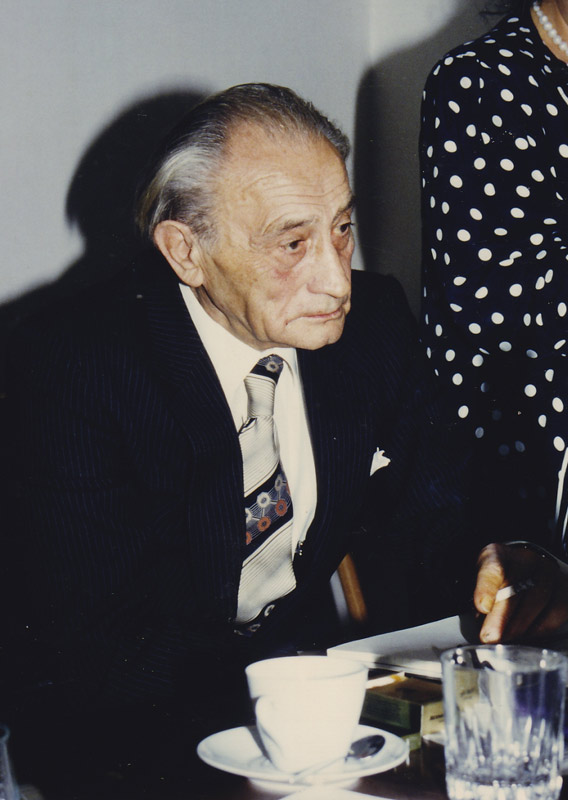 |
| PProf Zbigniew Antoni Scholtz, Chair of The Polish Centre |
It all started on a very small scale. The first "Akademia"- a concert combined with political speeches, held to celebrate either the Constitution of 3rd May 1791, or Independence Day, and usually followed by a dinner, took place in May 1965. The audience was greeted by the newly-elected chair, Sylwester Zakrzewski, the main speaker was Prof Zbigniew Antoni Scholtz, and the local children performed various songs and dances. On 26th November 1967, the Independence Day "Akademia" included the first outside guests, members of the "Egzekutywa Zjednoczenia Narodowego", representing the Presidency in Exile. They came to honour Monsignor Jozef Golab with the Gold Cross of Merit. Silver Crosses of Merit were awarded to Aldona Zakrzewska and Waclaw Swienc.
The first demonstration in the Polish Centre was a general meeting of the whole community, held on 22nd December 1970 to discuss the events in Poland's coastal cities. Stanislaw Czarzasty, then chair, suggested forming an Organisational Committee, chaired by Prof Zbigniew Antoni Scholtz, which included every single member of the "Zarzady" of the "Kolo", Club and Parents' Committee. At a public meeting held on 3rd January 1971, funds were collected for both the "Skarby Narodowe", representing the two émigré groups claiming the Presidency then in existence, and a resolution was passed, which was published in the Polish and local media: The free Polish community in Leamington Spa and the surrounding areas, send their condolences to the families of the victims of communist terror in Poland, in the cities of Gdansk, Gdynia, Szczecin and Slupsk.
A year later the Leamington Spa Polish community sent a petition to the local MP, Sir Dudley Smith, asking him to raise the issue of the 1940 Katyn Forest Massacre in Parliament. The petition was signed after mass, on 23rd May 1971, and was part of a lengthy, world-wide campaign by Polish communities to raise awareness of Soviet war crimes. The Soviet government finally admitted liability in 1989, but until then it had made extraordinary efforts to cover this matter up. In the 1970s, when the Katyn Memorial was being built in London, the Soviets tried to stop this. They relied on state assistance, and help was given by local authorities and even by the Church of England. This in turn outraged those who had lost family and friends at Katyn Forest. The extreme sensitivity of Katyn Forest, is evidenced by a letter written by former prime minister John Major on 19th December 1995, who argued that until the Soviets confessed, no amount of evidence would have been regarded as conclusive by the British government. In Leamington Spa a proposal to erect a plaque under the portico of the Polish Centre, was seen as too controversial to proceed with.
The Independence Day celebrations in November, were the main expression of the political attitudes of the community. Keynote speakers at these occasions, included Prof Zbigniew Antoni Scholtz, Zygmunt Szadkowski, chair of the SPK Federation (Polish Ex-Servicemen's Association), Colonel Roman Czerniawski, and Kazimierz Sabbat, prime minister of the Polish Government in Exile, who visited on 13th November 1977 and 18th November 1979. A full account of his second visit appeared in the local press.
Marking national celebrations appropriately has never been easy in a small community, which is why Polish artists from around the UK were invited to perform. There has always, however, been an absolute bar on performances by artists from Poland, as this would have meant contact with, and tacit recognition of the Warsaw regime. Among those who performed at the Polish Centre, were Antoni Hardy's Amateur Theatre Company from Coventry, opera singers including Stanislawa Horwat, Marian Nowakowski and Iwona Januszajtis, and the best London-based cabarets of PECH and M. Ostapko. There were also appearances by Dziedzic's South London Company, and Modrzewska's "Sami Swoi".
Excursions to Polish institutions in London sometimes replaced local celebrations. On 20th April 1974 members of the "Kolo" were welcomed by the President in Exile, Prof Stanislaw Ostrowski, at his London residence. They later went on to visit the General Sikorski Institute and Museum. In 1978 they visited the POSK Cultural Centre, and laid a wreath at the Katyn Forest Memorial. On 17th September 1989, Leamington Spa took part in the central commemoration of the 50th anniversary of the Soviet invasion of Poland, at the Cenotaph in Whitehall, and at the Wembley Conference Centre.
The Leamington Spa Polish community, organized through the "Kolo", was an active participant in the central political institutions of the émigré establishment in London. Various local individuals played a leading role. Chief among them, was Prof Zbigniew Antoni Scholtz, chair of the "Kolo" and the Polish Centre for 20 years, who was also a minister in the Government in Exile. He supported every local initiative to improve the situation in Poland, using the widest possible definition of the term.
On 9th October 1977 a Citizen's Committee was formed to organize the election of delegates to the General Conference of Poles in UK. Its members included Monsignor Jozef Golab, Prof Zbigniew Antoni Scholtz, D. Celinski, Stanislaw, Chojnacki, Stanislaw Galamaga, Victor Dior-Niewiarowski, Stefan Jankowicz, Stefan Kaszczyszyn, Stefan Wincenty Librowski, A. F. Misinski, Mieczyslaw Franciszek Lepkowski, Robert Ogorek, E. Pietrecki, Stefan Piotrowski, J. Poliszewski, Waclaw Swienc, Mieczyslaw Topolinski, Kazimierz Zielinski and Mieczyslaw Zielinski. The Citizen's Committee organized a public meeting to publicize the General Conference, and supervised the elections, which resulted in Kazimierz Zielinski becoming the delegate.
Two years later, the World Conference of Unity with the Nation's Struggle, was held in London to mark the 40th anniversary of the Nazi-Soviet invasion of 1939. It was attended by 2 delegates form Leamington Spa, Robert Ogorek and Kazimierz Zielinski. In the summer of 1980, during the first "Solidarity" period, Leamington Spa welcomed delegates of the Polish communities in the Midlands, who came to discuss the situation with ministers of the Government in Exile, Jerzy Zaleski and Mieczyslaw Sas Skowronski.
The period of martial law in Poland was a period of intensified efforts to help the situation there. In an effort to appeal to a wider British audience, in the summer of 1983 the Polish Centre organized an exhibition of sculptures by Dr Czeslaw Kelsey-Kolodynski. The exhibition was opened by the Mayor, and the guest list included influential local figures. Profits from the exhibition went to the Medical Aid for Poland Fund. A visit by Krzysztof Turkowski, a Solidarity activist from Wroclaw, in February 1989, enabled members of the community to gain an insight into the thinking of the Polish opposition, at a public meeting held at the Polish Centre. 1989 was a year of great change in Poland, and interest was high. In April 1989 the last elections to the National Council in Exile were held, coinciding with the "33% free" elections in Poland. In Leamington Spa 72 votes were cast, which was seen as a local verdict on the less than democratic process in Poland. Dr Stanislaw Jan Librowski was elected to the National Council in Exile, for the Midlands constituency. A few months later Witold Niewiarowski was elected delegate to the Conference of Free Polish People, held in London.
Unfortunately, in June 1990, just months before the collapse of the communist regime in Warsaw, and the first free elections, which he and the Polish exiles had worked for, for so long, Prof Zbigniew Antoni Scholtz, long-serving chair of the "Kolo", Club and Polish Centre, died aged 73. His funeral was the biggest political event ever held in the local area, and was attended by the highest authorities, including the President in Exile, Ryszard Kaczorowski. In December 1990 President Kaczorowski returned to Poland, to be recognized as the legitimate head of state, and to hand over power to the newly elected Lech Walesa. Amongst the 50 strong delegation from London, who attended Prof Zbigniew Antoni Scholtz's funeral, were ministers of the Government in Exile, members of the National Council in Exile, including the Speaker, Zygmunt Szadkowski, Lidia Cilkoszowa, leader of the PPS Polish Socialist Party, delegations from the SPK Ex-Servicemen's Association, together with their colours, the chair of the IPAK Catholic Institute, and numerous chairs of other organizations. The requiem mass was said by Monsignor Jozef Golab and Monsignor Stanislaw Swierczynski, Rektor of the Polish Catholic Mission in England & Wales. The hymns were sung by Iwona Januszajtis. At Leamington Spa cemetery numerous speeches were made at the graveside, following which everyone retired to the Polish Centre for a reception paid for by the Centre's "Zarzady". This sign of respect, and the guest list, were a fitting commentary on the deceased's life and work.
The true indicator of the local community's interest in general Polish affairs, was not so much attendance at meetings and conferences, but rather the financial support given to various causes over the years. The most important was the financing of the "Skarb Narodowy", the POSK Cultural Centre, when it was at its most vulnerable, and the organizations founded in the 1980s: The Free Speech Fund, Aid to Poland Fund, Medical Aid for Poland- particularly well supported by Dr Janina Parafjanowicz, and the Emergency Help for Poland Fund. In this last case Leamington Spa was the second largest donor. Local funds also supported the Sikorski Institute & Museum, The Polish Library in London, the war wounded, the restoration of the Monte Cassino monument, The PUNO University, the Committee for Aiding Poles in Russia, and the founders of the SPK colours in Chesterfield. Later, after the political situation changed in 1990, help was given to such causes as the "Poles Apart" radio programme on BBC CWR, the only one of its kind in the country.
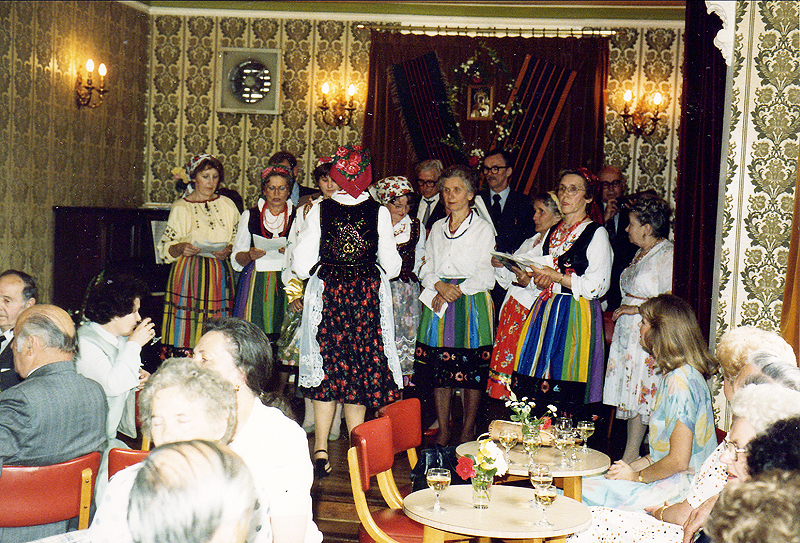 |
| Celebration of Constitution Day, 3rd May 1985 |
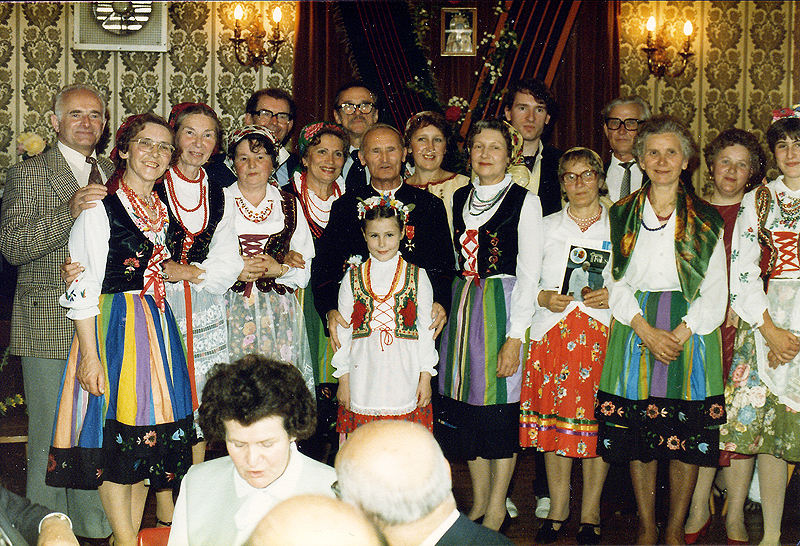 |
| Celebration of Constitution Day, 3rd May 1985 |
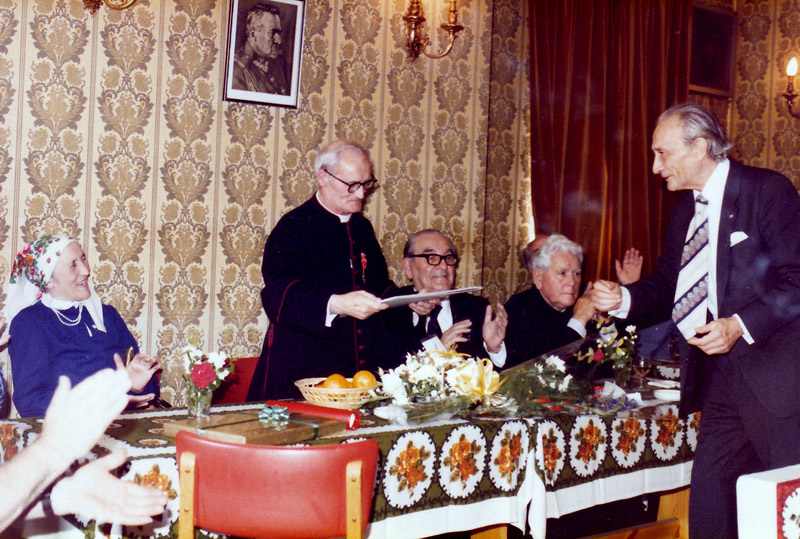 |
| Monsignor Jozef Golab receiving Poland's highest civilian honour the Polonia Restituta from prof Zbigniew Antoni Scholtz, Chair of The Polish Centre and minister in the Government in Exile, June 1985 |
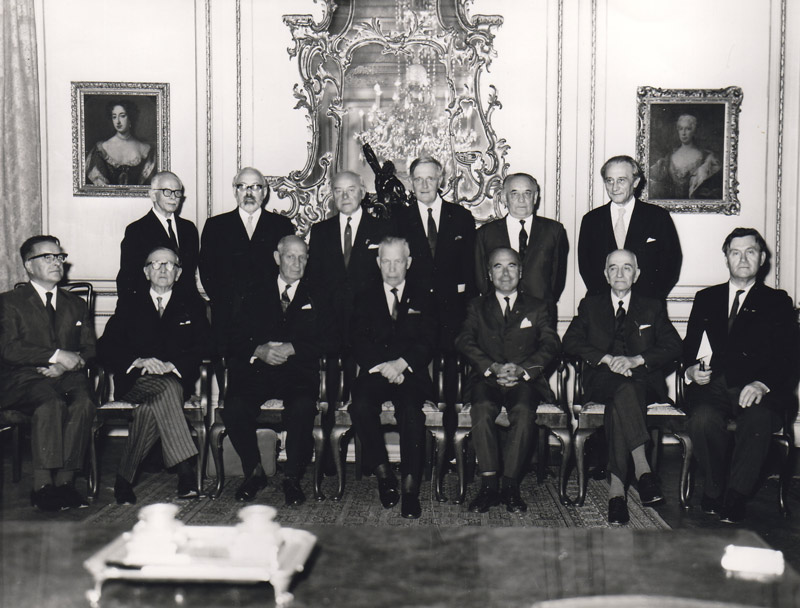 |
| The Polish Government in Exile in 1972. Prof Zbigniew Antoni Scholtz standing first from right |


